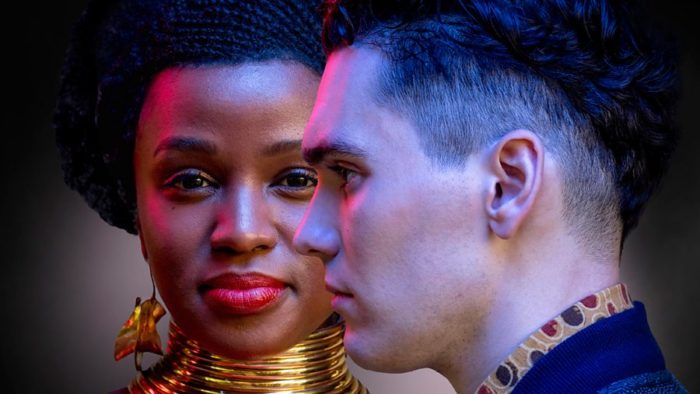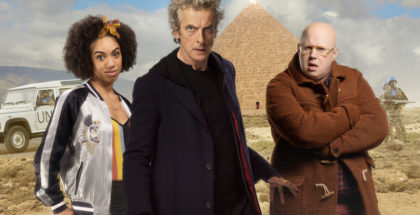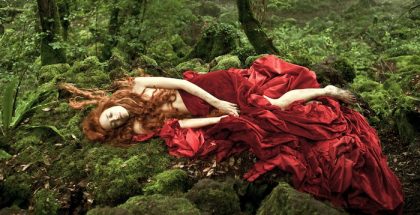UK TV review: Noughts + Crosses
Review Overview
Cast
10World-building
10Hope
10David Farnor | On 07, Mar 2020
Season 2 premieres on BBC One on 26th April 2022.
We’re in a dream age for dystopian fiction – a paradox if ever there were one – and a golden era for alt-history thrillers. Noughts + Crosses is based on Malorie Blackman’s novel of the same name, first published in 2001. 19 years later, it’s still blisteringly topical and breathtakingly bold.
The series introduces us to an alternate 21st century, where the black ruling class – the “Crosses” – lead society and the “Noughts” are the white underclass. Sephy Hadley (Masali Baduza), the daughter of the home secretary, crosses paths with Callum (Jack Rowan), a Nought and a friend since childhood. He’s there working as a waiter, while she’s there with Lieutenant Lekan Baako (Jonathan Ajayi), a military officer who believes firmly in the two-tier social hierarchy.
With a spark reignited between them, the stage is set for a star-crossed, socially forbidden romance, and Baduza and Rowan bring a wonderfully sincere chemistry to their relationship, from their initial attraction to their open awareness of the obstacles in the way of their happiness. Lekan is at the heart of those obstacles, and Ajayi is superb as the high-climbing officer in the Aprican army, who is fuelled by pragmatic ambition, insecurity and a fierce temper.
Adapted by Blackman – along with a team include Lydia Adetunji, Nathaniel Price, Toby Whithouse and Rachel De-Lahay – the series does a remarkable job of balance the personal with the political, anchoring every wider note of social tension in the immediate, intimate conflicts between the central cast. Those, in turn, are captured in the smallest of details, such as when Lekan mispronounces Callum’s name when they meet.
The whole show is built around that grippingly astute role reversal, and the world-building from directors Julian Holmes and Koby Adom is flawlessly details, right down the costumes, the music and the use of locations. Segregation, we’re told at the programme’s start, is over, but it shrewdly captures the little ways in which racial prejudice is still alive in society, whether it’s interactions with the law or people’s choice of words. “One of my best mates is in hospital,” Callum tells Sephy, after an” opening clash between Noughts and the authorities. “What happened?” she asks. “Police.” “Police what?” “Just police.”
In just six episodes, Noughts and Crosses boils a wide range of pertinent and incisive issues down into its tight-knit ensemble. Callum enters training for the Aprican military to prove that Noughts can be equal when allowed, which leaves him under Lekan’s cruel supervision. It also puts him at odds with his brother, Jude (an intense Josh Dylan), who is caught up with the violent activist group Liberation Militia, now led by Jack Dorn (a gruff, ruthless Shaun Dingwall) and previously the stomping ground of Callum’s dad, Ryan (a deceptively gentle Ian Hart), who is now concerned to see the fates of both his boys heading in dangerous directions. One moment where Callum, in uniform, comes face to face with Jude in a protest is gut-wrenchingly well acted.
Callum’s mother Meggie (the always-excellent Helen Baxendale), meanwhile, is a member of the Hadley family household, and has become a trusted friend of Sephy’s mother, Jasmine (Bonnie Henna). All of this makes the plans of home secretary Kamal particularly tricky. Paterson Joseph dominates the whole show as the calculating politician, who isn’t above working with the Liberation Militia to achieve his own ends. He also has a genuine concern for his daughter, which is only surpassed by his conviction regarding the superiority of the Crosses over the Noughts.
These complex threads are all woven together into a dazzlingly different and searingly recognisable tale, which manages to be gripping, heart-wrenching, bleakly timely and beautifully timeless. Things crucially end on a more optimistic note than the novel, offering a hope for real change and reconciliation at a time when it’s needed.



















